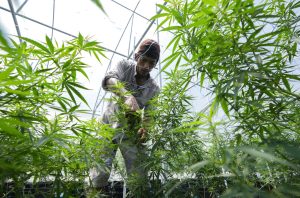Marijuana has always posed problems for authorities in Southeast Asia, where the plant has for centuries served as a traditional medicine and a simple herb for family recipes, but where laws against recreational use are harsh.
In some countries it’s considered a soft drug, but others lump it in the same category as heroin, cocaine, or meth, with critics arguing, despite a lack of evidence, that cannabis is a gateway drug for far worse and more highly addictive narcotics.
It was a quandary made all the worse by the “war on drugs” in the United States where the Drug Enforcement Administration (DEA) applied pressure on friendly states to follow their path which essentially amounted to absolute eradication.
Times and attitudes have changed, and Southeast Asian has started to follow the lead set by states in the U.S. in decriminalizing cannabis and hemp, with Thailand today becoming the first country in the region to allow legal production of the crop for commercial purposes.
The positive use of marijuana for medicinal properties is well documented and any person who has used cannabis to allay the side-effects of chemotherapy, including this journalist, can attest to its benefits, particularly in the relief of convulsions.
Thailand’s model remains conservative. The ban on recreational use is still in force, alongside jail terms and fines, but hospitals will be allowed to offer medical marijuana for a range of conditions while restaurants can add cannabis to their recipes, in food and drinks.
Thai authorities hope cannabis crops will bolster the country’s agriculture sector, offer further treatments for the sick and a fillip for the restaurant, bar, and tourism industries, which were quick to capitalize on decriminalization in other parts of the world.
To date, the market has been dominated by Australia, Canada, Israel, and Thailand plans to bolster its capacity by distributing millions of plants, for free, to homes across the country.
However, products will be restricted to a content of no more than 0.2 percent tetrahydrocannabinol or THC, the psychoactive compound that gets users high.
Nevertheless, the industry is lobbying Thai authorities to approve marijuana for recreational use and one proposal includes a “cannabis sandbox” with limited recreational use allowed in tourist areas.
Other countries in the region might follow suit. Several companies have expressed an interest in developing a cannabis industry in Cambodia, the Philippines, Laos, and Vietnam. Sources inside the industry say cannabis remains anathema in Malaysia and Indonesia.
Instrumental in establishing a Thai cannabis industry was Jim Plamondon, a former technical advisor for Microsoft who went to work as vice-president of marketing for the Thai Cannabis Corporation in 2018, which set Thailand on its path to legalization.
He got involved after his first wife died of a prescribed opioid overdose. She had suffered from chronic pain and Plamondon later learned that medicinal marijuana could have treated her pain with no risk of overdose or death. He has since retired in Cambodia.
“Cambodia has been growing great weed for centuries. That is a path to economic development that would actually work,” he said in an interview with the Khmer Times to mark Thailand’s legalization of cannabis. “Better to help people earn more profit from the crops that they already grown.
“I’m planting a small tropical fruit orchard, then a veggie garden, then ducks and fish in the pond. And maybe grow some medicinal weed, if and when it becomes legal here,” he added.

































